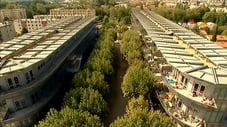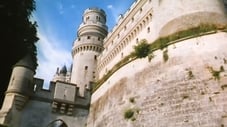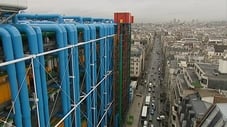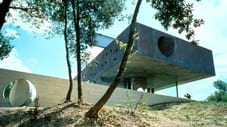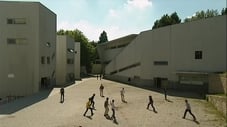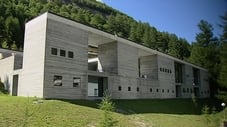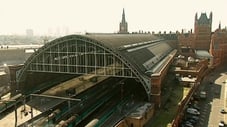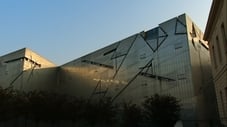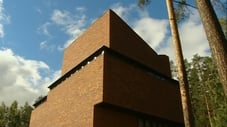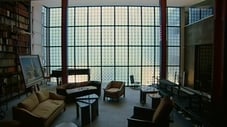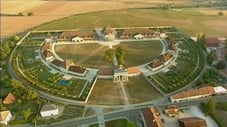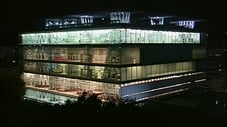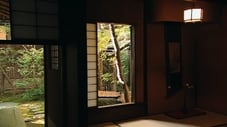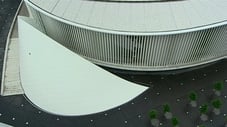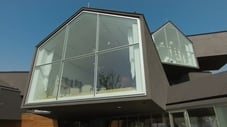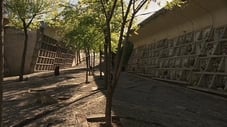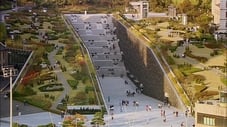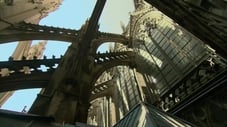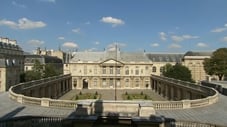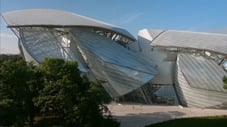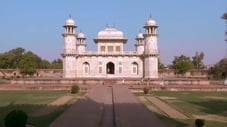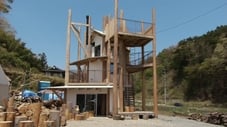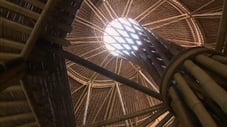
Architectures (1996)
← Back to main
Richard Copans — Director
Episodes 32
The Villa Dall'Ava
Rem Koolhaas built a unique villa on the heights of Saint-Cloud.
Read MoreNemausus 1
In Nîmes, Jean Nouvel conceived a block of tenement houses reminiscent of a cruise liner. An architectural utopia that pokes fun at the truisms of council housing.
Read MorePierrefonds, the Architect's Castle
Middle Aged castle rebuilt by Viollet Le Duc for the Emperor Napoleon III. A reconstruction that paradoxically opened the way for modern architecture.
Read MoreThe Georges Pompidou Centre
A giant meccano-like structure designed by Richard Rogers and Renzo Piano, a museum-factory that has become one of the most notable landmarks of the historical Parisian architectural landscape.
Read MoreA House in Bordeaux
Designed by the architect Rem Koolhaas for a couple whose husband became disabled following a road accident, the architect's plan for this ultra-modern house is shaped by the need to adapt to the husband's mode of travel.
Read MoreThe Siza School
The Portuguese architect Alvaro Siza built Porto's Faculty of Architecture, a mediation on space and light in a futuristic "agora". Alvaro was once a student and still teaches there today.
Read MoreThe Stone Thermal Baths
The Spa of Vals-les-Bains, designed by Peter Zumthor, redefines the very concept of public bathing, a mise en scène of water in all its aspects.
Read MoreThe Saint Pancras Station
In the 19th century in London, the Midland Company had Saint Pancras and a luxury hotel built. Engineer W.H. Barlow carried out a major feat, creating a 73 meter single-span hall, with no columns or pillars. As for architect Sir George Gilbert Scott, his Midland Grand Hotel was a neo-gothic manifesto.
Read MoreThe Jewish Museum Berlin
The Jewish Museum in Berlin, by Daniel Libeskind, tackles the emptiness left by the extermination of Europe's Jews during the Second World War. His response is an architecture of absence.
Read MoreThe Convent of La Tourette
With the Convent of La Tourette, commissioned by the Dominicans of Lyons, Le Courbusier was charged with the task of creating this rural convent retreat. A reinvention of religious architecture, its rough concrete form houses one hundred sleeping rooms plus recreational spaces.
Read MoreThe Municipal Center of Säynätsalo
Built in 1952 by Alvaar Alto, this town hall building lies in the heart of a rugged landscape in Finland. It represents a humanist masterpiece, and pays modern homage to the Ideal City of the Italian Renaissance.
Read MoreThe Glass House
In 1928, Pierre Chareau built the poetic and remarkable Maison de Verre, one of the unique buildings of the 20th century. Inserted into an existing building, the views dissolve through semi-transparent materials, juxtaposing metal and glass, almost taking it into the realms of Surrealism.
Read MoreThe Royal Saltworks of Arc-et-Senans
The visionary architect Claude Nicolas Ledoux, one of the earliest exponents of French Neoclassical design, built a monumental factory for the king of France at the end of the 18th century. It is pragmatic and utopian, an aesthetic revolution.
Read MoreThe Multimedia Library of Sendai
A glass cube, built in 2001 by Toyo Ito, this library provides an example of immaterial and evanescent architecture. The multimedia library is located on a tree-lined avenue in Sendai, Japan. Its transparent facade allows for the revelation of diverse activities that occur within the building.
Read MorePhaeno, Building as Landscape
The sculptural power of the science center in Wolfsberg, Germany, in which the plan is a landscape - the landscape of Zaha Hadid's experience. The building is the realization of an imaginative world that we know vividly through twenty years of abstract images. It permits us to experience space in ways that never seemed possible before.
Read MoreThe House of Sugimoto
Built in Kyoto in 1743, this traditional Japanese architectural masterpiece portrays a different understanding of architecture and building. It is a typical 'machiya' (Kyoto traditional townhouse) and was one of the largest built during the Meiji period.
Read MoreThe Reception and Congress Building in Rome
In the most ambitious of the Mussolini regime's buildings, the leader of Italy's modern movement Adalberto Libera attempted the impossible combination of fascism with modernity. It reflects Libera's great ability to design ambiguously in a space, metaphysical language that sits on a knife-edge between modernism and neo-classicism.
Read MoreThe Yoyogo Olympic Gymnasiums
For the 1964 summer Olympic Games in Tokyo, Kenzo Tange designed two concrete gymnasiums which evoke a sense of movement. Famous for their suspension roof design, they are regarded by many as being among the most beautiful buildings of the 20th century.
Read MoreThe Royal Mosque at Isfahan
In 1598, King Abbas planned an immense urban project. His royal mosque captured his unprecedented wealth, an art of living, the king's power, and the talent of the architect Ali Akbar Esfahani.
Read MoreThe SAS Royal Hotel
The SAS Royal Hotel tower marked Denmark's entry into post-war modernity. It is a major work that combines functionalism, simplicity and elegance, and in which everything, from the ashtrays to the buildings volumes, were created and designed by Arne Jacobsen.
Read MoreThe Luxembourg Philharmonic
The elliptical shaped Philharmonic, with its filter of white columns and colorful cliffs, houses the Grand Auditorium in the manner of a jewel in its display case. It is one of the most beautiful building from architect Christian de Portzamparc.
Read MoreThe Igualada Cemetery
We don't have an overview translated in English. Help us expand our database by adding one.
Ewha, the Seoul Hidden University
With this building, Dominique Perrault continues a concept that is dear to him, the absence of architecture. The urban dimension and the way the surrounding land is organized prevail over the construction. The landscape supplants the architecture.
Read MoreThe Cologne Cathedral
Started in 1247, the Cologne Cathedral was completed in 1880 after a 300 year break in the work carried out on it. The Cathedral, which embodies the unity of Germany, is both a Gothic archetype and one of the most magnificent buildings completed during the 19th century.
Read MoreThe Citadel of Leisure, the Pompeia Social Service Center
In the Palmeiras district of São Paulo, early 20th century former factory workshops are aligned with strange blocks of cement that stand tall, facing the city. Could the "Citadel of Leisure" be a major work of "Architecture Povera"?
Read MoreThe Hotels de Soubise and de Rohan
From 1705 to 1752, the house of the Princes of Soubise was the setting for wild ambition and dreams of grandeur, with the dual purpose of transforming and renaming the Hotel de Guise for the Prince's heir, and of building a second mansion for his fifth son, the Prince Bishop of Strasbourg.
Read MoreThe French Communist Party Headquarters
A mysterious white dome and an undulating glass facade, the headquarters of the French Communist Party, built between 1965 and 1980, by Oscar Niemeyer. A fine example of the curtain wall designed by Jean Prouve, an extraordinary Central Committee room under the dome, and some of the finest Parisian architecture of the period.
Read MoreThe Glass Galleon
On the fringes of the Bois de Boulogne in Paris, a grand galleon with 12 glass sails, billowing in an imaginary wind, towers above the treetops. It is a new building, designed by Frank Gehry, dedicated to contemporary art that offers visitors an architectural tour.
Read MoreItimad-ud-Daulah, the Mughal Mausoleum
The mausoleum of Itimad-ud-Daulah, built of white marble encrusted with semi-precious stones, in Agra the capital of the Mughal Empire. Islamic funeral rites are strictly observed in a structure that combines representations of paradise.
Read MoreThe Home for All at Rikuzentakata
After Japan's 2011 tsunami, a group of architects led by Toyo Ito launched the "Home for All" project, providing community centers for the inhabitants of the devastated towns. Three architects, Su Fujimoto, Kumiko Inui and Akihisa Hirata, each built one of these homes in Rikuzentakata.
Read MoreThe Bamboo School of Bali
An astonishing structure in which three cones flow together into one roof that protects a school building made of bamboo. An ambitious program built only with an entirely renewable material.
Read More
